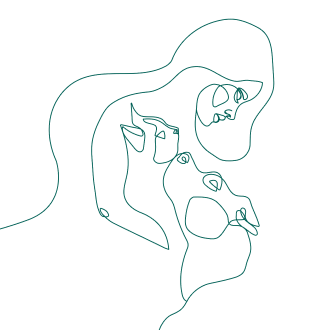About Cats
Dog not eating: reasons why a dog refuses to eat
Dec 20, 2021
Why has your dog lost its appetite
- Psychological reasons
- Physiological causes
- Gourmet dog
- How to increase your pet's appetite
- What to do if appetite does not return

Dogs are not that picky about food, they happily eat the same thing for a long time. But the refusal of a treat portion should alert the owner. Perhaps, your dog is not hungry or just not in the mood to eat. However, a lack of appetite may be a consequence of stress or indicate a serious illness. So why is your dog not eating?
Why has your dog lost its appetite
Any change in eating behavior signals something. Though the reasons for refusing a meal can be different, they are divided into 2 categories:
- Psychological
- Related to health (physiological)
Psychological reasons
There is no need to panic — in most cases, you can deal with the reasons for refusing to eat on your own, without the help of the vet.
Stress or anxiety
Your dog refuses to eat when affected by stress. The factors that could be causing your dog stress:
- Your family or partner having a newborn baby
- A new pet
- Moving into a new house and the like
In this case, it is important to try to maintain the same daily routine and key points: time, frequency and number of outside walks, as well as feeding schedule, type of diet and other individual moments.
Change of daily routine
Dogs are forced to adapt to the rhythm of their owners. A new work schedule, the family going on holiday — can all affect the feeding schedule of your pet. And your dog needs a little time to adapt to the changes.
Physiological causes
A dog can live without food for up to 5 days, but you should sound the alarm even on the second day of complete starvation. And if there are no psychological and behavioral reasons for the loss of appetite, it is most likely to be a health matter. Anorexia in an animal can be caused by tumors, pancreatitis, kidney and heart problems, injuries and many other diseases. Let us consider the main ones.
Intestinal issues
Inflammation of the stomach lining and intestines (gastroenteritis) causes nausea and loss of appetite.
Ate something wrong
While being walked, the dog may have swallowed a foreign object or inedible product. This can lead to loss of appetite due to abdominal pain, obstruction, vomiting, or upset stomach. You should take your pet to the vet immediately as surgery may be required to remove the foreign object from the intestine. If a dog has swallowed particles of household chemicals, rat poison, they will not eat either due to poisoning and general unwellness.
Dental problems
Refusal to eat can signal problems with a dog’s teeth and gums. In such cases, the dog has stopped eating because it hurts to bite and chew food. If your pet allows it, examine their mouth for signs of inflammation, or suppuration, which can be caused by an affected tooth.
Once the toothache is cured, the dog’s appetite normally returns. Vets recommend brushing your pet's teeth on a regular basis to prevent such problems.
Vaccination
Routine (bacterial, viral, parasitic) vaccines can cause an appetite disorder, which owners are always warned about in the veterinary clinic.
Ticks
Tick-borne diseases (ehrlichiosis, babesiosis, Lyme disease) are dangerous for dogs. The general condition of the animal is depressed, the dog runs a temperature, the color of its urine changes, and lymph nodes are enlarged. Urgent veterinary help is required.
Newborn puppies expected soon
When a female dog goes into labor, their appetite is supressed.
Overfed
Sometimes your pet does not eat even there are no physiological or psychological reasons for refusing the meal. Maybe your dog is just not hungry? Sometimes owners calculate the portion size incorrectly, and their animal overeats. If your dog is active, plays well and drinks water, you should reassess the portion size. Consider your pet's weight, size, breed, and age.
Gourmet dog
Animals that have received different kinds of food may become fussy about it and refuse to eat food that does not seem tasty enough to them. Dogs can also become picky when their feeding schedule is not observed or owners feed them from the table. Follow these rules to get your pet to eat dog food:
- Select a specific food.
- Set feeding hours.
- Stop feeding your dog treats.
Your pet may go on hunger strike if the food is no longer fresh or spoiled. Therefore, it is important to comply with the storage conditions for purchased food, check the expiration date of, and only use fresh products if you prepare your dog’s meal yourself.
To support healthy skin and a shiny coat, we recommend the CLUB 4 PAWS premium “Lam and Rice” dog food.
How to increase your pet's appetite
If the examination by the vet reveals no medical problems, then the cause is stress or other factors that affect your dog's behavior. Here are some useful tips to help you restore your pet’s healthy appetite:
- Alternate between different dog foods. Mix dry and wet foods, mix flavors to make your pet feel like eating. Keep in mind that no more than 10-15 percent of the dry diet can be replaced with wet food on its own.
- Add a treat. It could be a favorite treat, some permitted human food such as chicken, broth, beef, or fish, but remember they should not contain salt and spices, or onions and garlic — vegetables that are potentially dangerous for dogs.
- Keep food fresh. Ensure that your dog has free access to clean water at all times.
- Work up your dog’s appetite by taking them out for a brisk walk. Dogs burn off little energy indoors and do not feel the need to replenish it with something nutritious.
- Create a feeding schedule. For an adult pet, offer 2–3 meals a day at a certain time; puppies need more frequent meals. Do not leave food in the bowl. Remove it after 10 minutes if your pet has not touched it. This will develop the instinct to eat on schedule.
What to do if appetite does not return
If the problem is not resolved, and the hunger strike has lasted for several days and is accompanied by diarrhea, vomiting, refusal of water, you should consult the vet immediately. Your dog may need medication, which will be prescribed by the vet after examination and collection of anamnesis.
We have listed the main reasons why your dog can stop eating. Most of them are psychological and your pet's appetite is easy to restore. But a hunger strike can signal a complex disease. Therefore, monitor your pet’s behavior carefully to determine loss of appetite in time and help your four-legged friend.




